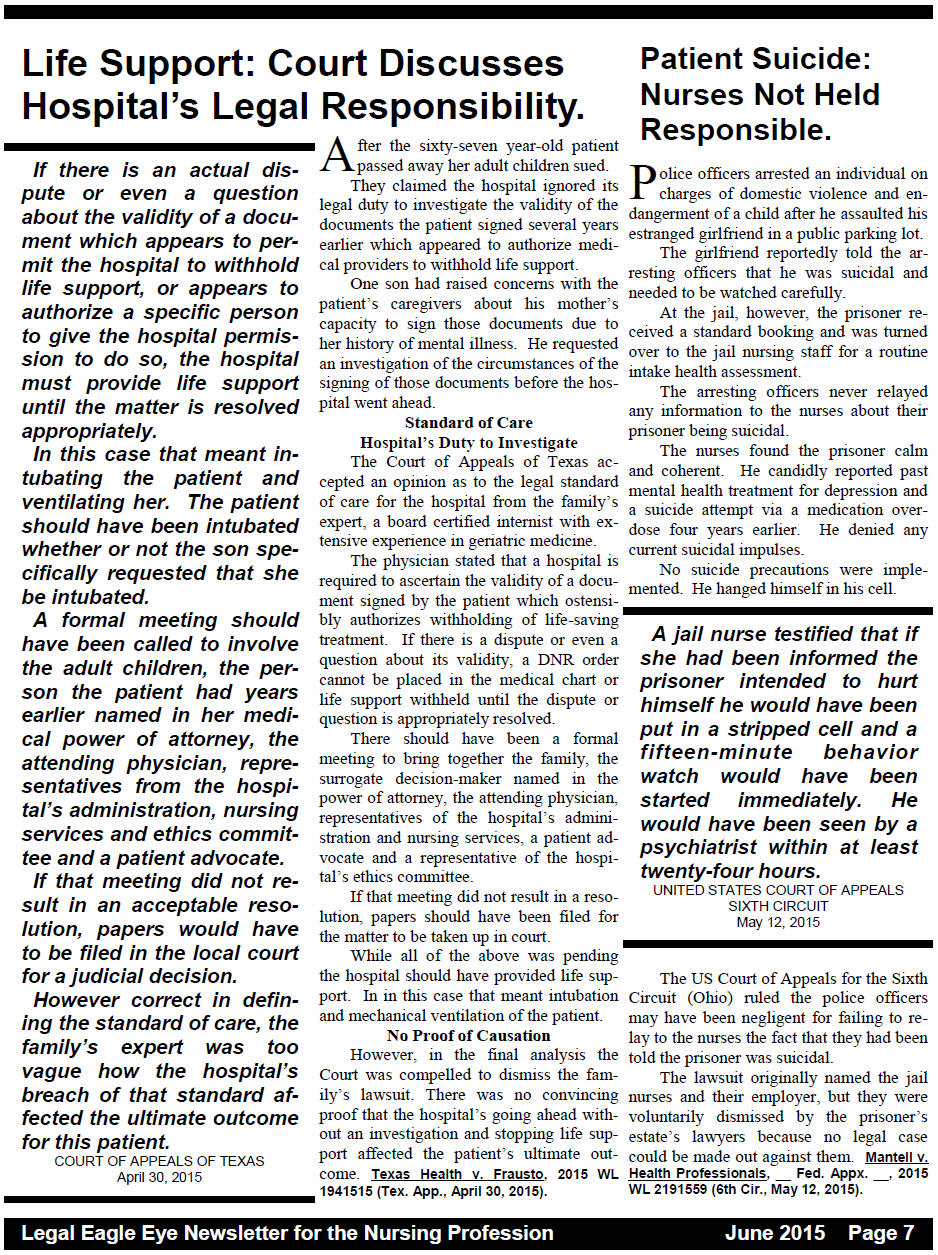
Legal Eagle Eye Newsletter for the Nursing Profession Home Page
New Subscriptions I About Our Newsletter I Sample Newsletter I FAQ I Contact Us

Persistent Vegetative State - No Advance Directive: Right Of Substitute Decision Maker To Refuse Care Upheld By Court
Quick Summary: The decision to remove life sustaining treatment from an adult in a persistent vegetative state, who did not leave expressed directions as to the maintenance of life support, can be made by a close family member and two qualified physicians, without court approval.
A young man sustained severe head injuries and never regained consciousness.
After he had been in a nursing home for seventeen years, his mother asked the nursing home to remove his gastrostomy tube, and to let her son expire.
The nursing home refused to terminate life support, unless so ordered by the court.
Two neurologists, one court-appointed, the other retained by the mother, concurred there was no chance for reversal of the patient’s persistent vegetative state.
Her son had never expressly stated his wishes concerning life support, but his mother believed he would not have wanted his life prolonged artificially.
The court accepted the mother’s judgment as her son’s substitute decision maker.
SUPREME COURT OF PENNSYLVANIA, 1996.In 1972 a twenty-year-old man sustained severe head injuries, but regained consciousness with marked limitations in his cognitive abilities compared to his pre-injury status. In 1976, while being treated in a hospital, he suffered a second head injury, in a manner not specified in the court record, from which he never regained consciousness. Shortly thereafter, he was diagnosed as being in a persistent vegetative state.
For purposes of deciding the present case, the Supreme Court of Pennsylvania accepted the definition of persistent vegetative state as:
"A body which is functioning entirely in terms of its internal controls. It maintains temperature. It sustains heart beat and pulmonary ventilation. It maintains digestive activity. In maintains reflex activity of muscles and nerves for low level conditioned responses. But there is no behavioral evidence of either self-awareness or awareness of the surroundings in a learned manner."
The court made note that the Arizona Supreme Court recently described persistent vegetative state as "a twilight zone of suspended animation, where death commences, while life, in some form, continues."
The court noted a change in terminology, proposed by the medical community after the physicians in this case had already stated their opinions for the court record. A persistent vegetative state is now considered a wakeful unconsciousness that lasts more than a few weeks, while a permanent vegetative state is a persistent vegetative state that lasts for more than a year. This distinction would not have altered the court’s decision in this case.
In passing, the court also noted that artificial nutrition and hydration do fall within the parameters encompassed by the generally accepted legal definition of medical treatment.
After her son had been in a nursing home seventeen years, his mother, who was also the individual whom the court had appointed as his legal guardian twelve years earlier, asked the nursing home to stop hydrating and feeding him, to remove his gastrostomy tube, and to let him expire.
The nursing home refused. The mother filed suit for a court order directing the nursing home to do as she had asked. The state attorney general came into the case as nominal legal representative for the patient. The court appointed a neurologist as its independent medical expert.
Two neurologists, one the court-appointed independent medical expert, the other retained to testify for the mother, concurred within a reasonable degree of medical certainty that the son’s condition would never improve and he would always remain in the same persistent vegetative state in which he had been for seventeen years. However, existing medical technology, in their opinion, could continue to support his basal functions and prolong his life for an additional ten to twenty years.
The mother testified that her son had never expressly made his wishes known what should be done should he lapse into a persistent vegetative state. Nevertheless, based on her son’s "love of life," according to the court, the mother was of the opinion that under the circumstances her son would wish his gastrostomy tube removed so that he could die.
The court ruled that the policy behind the law is strongly in favor of medical self-determination, including the right to refuse life-sustaining treatment. The judgment of a substitute decision maker who is familiar with the patient’s own personal ethical, philosophical and religious value system regarding medical issues should be given the highest consideration by the legal system, assuming the fact the patient’s loss of consciousness is irreversible is supported by overwhelming medical evidence.
In re Fiori, 673 A. 2d 905 (Pa., 1996).More references from nursinglaw.com
http://www.nursinglaw.com/life-support-hospital-legal-responsibilities.htm
http://www.nursinglaw.com/lifesupport2.pdf
http://www.nursinglaw.com/persistent-vegetative-state-legal-fundamentals.pdf
http://www.nursinglaw.com/vegetative.pdf